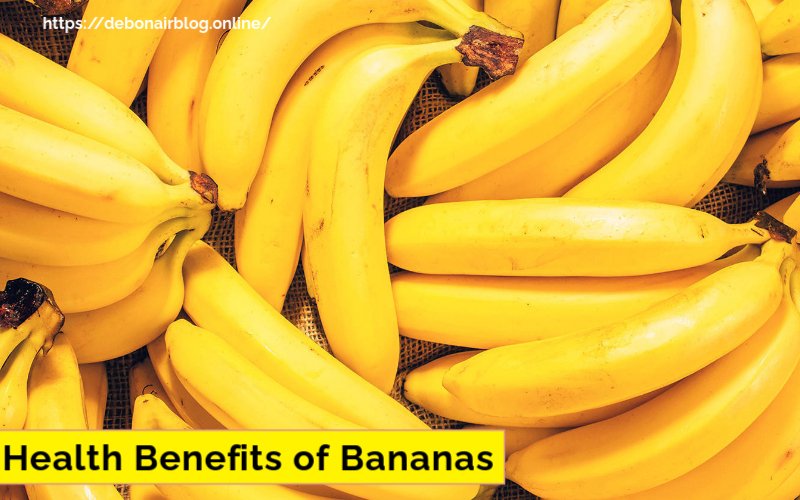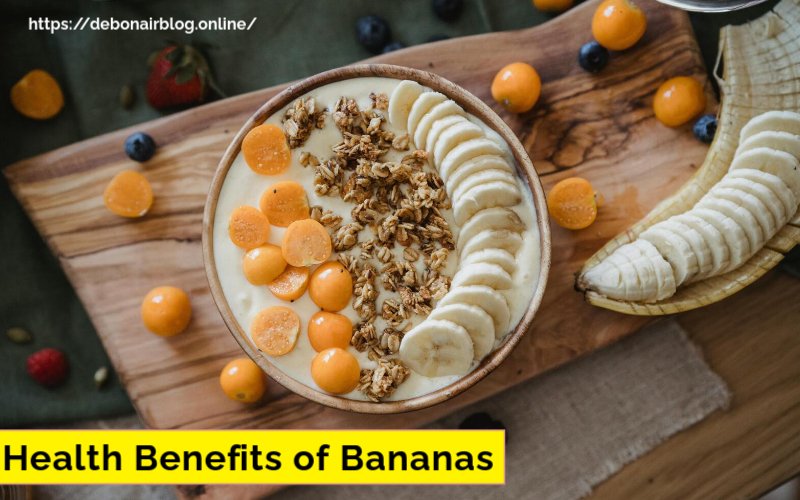
Bananas: Unlocking the Health Benefits of This Everyday Fruit in 2024
Table of Contents
Bananas are one of the most popular fruits worldwide, loved for their sweet taste, convenience, and versatility. But did you know that they also pack a powerful nutritional punch?
In this article, we’ll explore the fascinating world of bananas, diving into their health benefits, nutritional value, and creative ways to incorporate them into your diet. So, let’s peel back the layers and discover why bananas deserve a spot in your daily meals!
The Nutritional Powerhouse: Understanding Banana Nutrition
When it comes to banana nutrition, these fruits are not just tasty; they are also incredibly nutritious. A medium-sized banana contains about 105 calories, making it a low-calorie snack option. They are rich in essential vitamins and minerals, including:
- Potassium: One of the standout features of bananas is their high potassium content. A medium banana provides around 422 mg of potassium, which is crucial for maintaining heart health and regulating blood pressure.
- Dietary Fiber: Bananas are a great source of dietary fiber, with about 3 grams per medium fruit. This fiber aids digestion and helps keep you feeling full longer.
- Vitamins: Bananas are rich in vitamin C, vitamin B6, and small amounts of other vitamins like vitamin A and folate.
The combination of these nutrients makes bananas an excellent choice for anyone looking to improve their overall health.
Health Benefits of Bananas: More Than Just a Snack
Bananas offer numerous health benefits that can enhance your well-being. Here are some key advantages:
Heart Health
The high potassium content in bananas plays a significant role in heart health. Potassium helps regulate blood pressure by balancing sodium levels in the body. Studies have shown that diets rich in potassium can lower the risk of stroke and heart disease.
Weight Loss Support
If you’re looking to shed some pounds, bananas can be a helpful ally. Their fiber content promotes satiety, helping you feel fuller for longer periods. Plus, they make for a convenient snack that can curb cravings without adding too many calories to your diet.
Digestive Health
Bananas are known for their digestive benefits due to their fiber content. The soluble fiber in bananas helps regulate bowel movements and prevent constipation. Additionally, bananas contain prebiotics that nourish beneficial gut bacteria, promoting a healthy digestive system.here some articles on digestive foods:
Energy Boost
Feeling sluggish? Bananas can provide a quick energy boost! They contain natural sugars like glucose, fructose, and sucrose, making them an ideal snack before or after workouts. Eating a banana can help replenish your energy levels and keep you going throughout the day.
Exploring Banana Varieties: From Dessert to Cooking Bananas
While many people are familiar with the classic yellow Cavendish banana, there are numerous other varieties worth exploring:
- Plantains: Often confused with regular bananas, plantains are starchier and typically used in cooking rather than eaten raw. They can be fried, boiled, or baked.
- Red Bananas: These smaller bananas have a reddish-purple skin and are sweeter than Cavendish bananas.
- Burro Bananas: Known for their unique flavor and creamy texture, Burro bananas have a distinctive square shape.
Each variety has its culinary uses and flavor profiles, making bananas an incredibly versatile fruit!
Creative Ways to Use Bananas in Your Recipes

Bananas aren’t just great on their own; they can enhance various dishes as well! Here are some delicious banana recipes to try:
Banana Bread
One of the most beloved uses for ripe bananas is making banana bread. Here’s a simple recipe:
- Preheat your oven to 350°F (175°C).
- Mash 3 ripe bananas in a bowl.
- Mix in 1/3 cup melted butter.
- Stir in 1 teaspoon baking soda and a pinch of salt.
- Add 3/4 cup sugar (you can reduce this if desired) and 1 beaten egg.
- Finally, mix in 1 teaspoon vanilla extract and 1 cup of flour.
- Pour the batter into a greased loaf pan and bake for about 60 minutes.
This moist banana bread is perfect for breakfast or as an afternoon snack!
Smoothies
Adding bananas to smoothies is an excellent way to boost flavor and nutrition. Simply blend one banana with your favorite fruits (like berries or spinach), yogurt or milk (dairy or non-dairy), and ice for a refreshing drink.
Pancakes
Banana pancakes are a delightful twist on traditional pancakes! Mash one ripe banana into your pancake batter for added sweetness and moisture.
The Science Behind Banana Calories: Are They Really That High?
When it comes to banana calories, many people wonder if they should be cautious about consuming them due to their natural sugars. While it’s true that bananas do contain sugars, they also provide essential nutrients that contribute positively to your overall diet.
A medium banana has approximately 105 calories—relatively low compared to many snacks available today! When considering calorie intake, it’s essential to focus on nutrient density rather than just calorie count alone. The vitamins, minerals, and fiber found in bananas make them an excellent choice for healthy snacking.
Antioxidants Galore: How Bananas Fight Free Radicals
Bananas are not just nutritious; they also contain antioxidants that help combat oxidative stress in the body. Antioxidants protect your cells from damage caused by free radicals—unstable molecules that can lead to chronic diseases.
The primary antioxidants found in bananas include dopamine and catechins. These compounds have been linked to various health benefits, including reduced inflammation and improved heart health.
Can Dogs Eat Bananas? Understanding Pet Safety
If you’re a dog owner wondering whether you can share your love for bananas with your furry friend—good news! Yes, dogs can eat bananas in moderation.
Bananas provide dogs with vitamins B6 and C as well as potassium. However, due to their sugar content, it’s best not to overdo it—stick to small pieces as an occasional treat rather than a regular part of their diet.
Frequently Asked Questions About Bananas
Here are some common questions people ask about this beloved fruit:
Can dogs eat bananas?
Yes! Dogs can enjoy small amounts of banana as an occasional treat due to its nutritional benefits.
How many calories are in a banana?
A medium-sized banana typically contains around 105 calories.
How do I make banana bread?
To make banana bread, mash ripe bananas with melted butter, sugar, eggs, flour, baking soda, and salt before baking at 350°F (175°C) for about an hour.
Are bananas good for dogs?
In moderation, yes! Bananas provide vitamins but should only be given as an occasional treat due to their sugar content.
What are the health benefits of bananas?
Bananas offer various health benefits including improved heart health due to potassium content, digestive support from dietary fiber, energy boosts from natural sugars, and antioxidant properties.
What is the fiber content in a banana?
A medium banana contains about 3 grams of dietary fiber which aids digestion.
Can I eat too many bananas?
While bananas are healthy when consumed in moderation—eating excessive amounts may lead to increased sugar intake or digestive discomfort due to high fiber content.
What vitamins do bananas contain?
Bananas are rich in vitamin C and vitamin B6 along with smaller amounts of other vitamins like vitamin A and folate.
What are cooking bananas?
Cooking bananas refer primarily to plantains—starchier varieties used mainly for cooking rather than eaten raw like dessert varieties such as Cavendish.
How should I store ripe bananas?
Keep ripe bananas at room temperature until fully ripe; once ripened store them in the refrigerator where they will last longer without spoiling quickly!
Can I freeze bananas?
Yes! You can freeze ripe bananas by peeling them first—place them in airtight bags or containers before freezing for later use in smoothies or baking!
What types of recipes can I make with bananas?
You can use bananas in various recipes including smoothies, pancakes, muffins/breads & desserts like ice cream or pudding!
Real-Time Case Study: Transforming Breakfast with Bananas

Let’s take a look at how one family transformed their breakfast routine by incorporating more bananas into their meals:
Meet the Smiths—a busy family of four who wanted healthier breakfasts without sacrificing taste or time. After learning about the health benefits of bananas, they decided to experiment with different ways to include them each morning:
- Smoothie Bowls: They began blending frozen fruits with yogurt topped with sliced fresh banana.
- Overnight Oats: By adding mashed ripe banana into overnight oats along with chia seeds & almond milk—they created deliciously creamy breakfasts!
- Banana Pancakes: On weekends when they had more time—they made fluffy pancakes using mashed ripe banana mixed into traditional batter.
- Peanut Butter & Banana Toast: As quick snacks before school—they spread peanut butter on whole-grain toast topped with sliced banana!
By making these simple changes—the Smiths reported feeling more energized throughout their mornings while enjoying tasty meals together! Their kids even started requesting more fruits at breakfast time—showing how easy it is to encourage healthy eating habits through fun & delicious options like bananas!
Conclusion: Embrace the Banana!
In conclusion, incorporating bananas into your diet is not only enjoyable but also incredibly beneficial for your health! With their rich nutritional profile packed with potassium, dietary fiber, vitamins & antioxidants—bananas truly deserve recognition as one of nature’s best superfoods!
From classic recipes like banana bread & smoothies—to innovative uses such as toppings on pancakes or toast—the possibilities are endless when it comes to enjoying this versatile fruit! So next time you’re at the grocery store—don’t forget those bright yellow beauties! Your taste buds (and body) will thank you!

